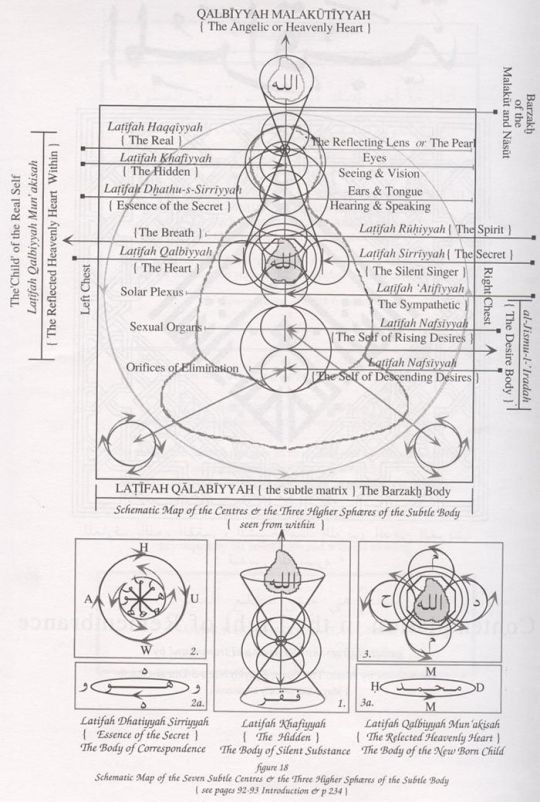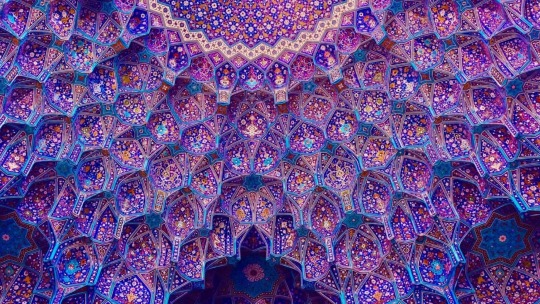Text
وَٱلۡقَمَرَ قَدَّرۡنَـٰهُ مَنَازِلَ حَتَّىٰ عَادَ كَٱلۡعُرۡجُونِ ٱلۡقَدِیمِ﴿ ٣٩ ﴾
“As for the moon, We have ordained ˹precise˺ phases for it, until it ends up like an old, curved palm stalk.”
- Quran 36:39

1. The trajectory of the moon during a month
2. The form of a dried up date branch when it dries up under the sun
4 notes
·
View notes
Text
It is forbidden to force anyone to convert to Islam or to practice its teachings if it doesn’t originate from the heart. There is no room for compulsion of any sort.
Because the best thing that a Muslim can do to preach Islam is to preach it with wisdom in argumentation and by incorporating the Islamic values in one’s character. Everything else rests upon the person whether he or she believes or not.
Surely, We have revealed to you the Book with the truth for all mankind; so whoever follows the right way, it is for his own soul and whoever errs, he errs only to its detriment; and you are not a custodian over them.
- Quran, 39:41
The following verse guides Muslims on the appropriate behaviour and right attitude towards people who reject Islam. It is considered a fundamental principle of Islamic law that people should be free to practice their religion without hatred nor fear.
Say, “O disbelievers,
I do not worship what you worship.
Nor are you worshippers of what I worship.
Nor will I be a worshipper of what you worship.
Nor will you be worshippers of what I worship.
For you is your religion, and for me is my religion.
- Quran, 109:1-6
It hints that even if people are free to believe in any religion that invokes their faith, the truth and falsehood cannot be allowed to mix.
Let there be no compulsion in religion.
Verily, the right course has become clear from the wrong.
So, whoever rejects evil and believes in God has grasped the most trustworthy handhold, that never breaks.
And God is All-Hearing and All-Knowing.
- Quran 2:256
This verse emphasis the importance of free will in Islam. The Holy Quran encourages people to seek knowledge, to reflect on their beliefs, and to choose their faith based on their own understanding and conviction. As believers will be able to distinct the right from the wrong.
7 notes
·
View notes
Photo

While in Mecca, Malcolm X wrote to his assistants:
“They asked me what about the Hajj (pilgrimage to Mecca) impressed me the most. I said: ‘The brotherhood! The people of all races, colors, from all over the world coming together as One! It has proven to me the power of the One God.’ All ate as one, and slept as one. Everything about the pilgrimage atmosphere accented the Oneness of man under One God.”
ٱلْحَمْدُ لِلَّٰهِ
12 notes
·
View notes
Text
Equality in Islam

Every year, Muslims from all over the world take part in one of the largest gatherings on Earth, the Hajj of pilgrimage to Mecca.
This great annual convention of faith demonstrates the concept of equality of mankind, the most profound message in Islam, which allows no superiority on the basis of race, gender or social status. The only preference in the eyes of God is piety as stated in the Quran,
O humanity! Indeed, We created you from a (pair) male and a female, and made you into peoples and tribes so that you may [get to] know one another. Surely the most noble of you in the sight of Allah is the most righteous among you. For He is All-Knowing, All-Aware.
Quran 49:13
During the days of Hajj, Muslims dress in the same, simple way. Black and white, rich and poor, men and women, old and young will all stand before God; all brothers and sisters. There is no royalty and aristocracy, but humility and devotion. These times confirm the commitment of all Muslims to God. It affirms their readiness to leave material interest for His sake.
Ultimately, the Hajj is a reminder of the Grand Assembly on the Day of Judgement when people will stand equal before God, waiting for their final destiny. And as the Prophet Muhammed ﷺ (peace be upon him) said,
God does not judge according to your bodies and appearances, but He scans your hearts and looks into your deeds.
4 notes
·
View notes
Text
Life as the ultimate Test
The Quran describes life as a test, because God sent us to Earth to challenge our own perceived limitations and to help us unveil our vast array of capabilities.
Do people think once they say, “We believe,” that they will be left without being put to the test?
Quran 29:2
When we shift our perspective from what God is doing to us, to what God is doing for us, we are able to see that although God may not always give us what we want, He will always give us exactly what we need.
It may be that you hate something and it is good for you and it may be that you love something and it is bad for you.
Quran 2:216
He gives you people to love you, to leave you, to inspire you, to doubt you, and to believe in you. Out of His love, God lets the world hurt you and break you, not because he wants to destroy you, but because He wants to show you your hidden strengths that can only be manifested in the cocoon of trials.
God takes us into the cave of difficulty and pain when there are gems for us to find there. When hardship first arrives, it makes little sense: it feels unjust, unfair, like a punishment or undeserved pain. But truly, the difficulties we face can act as catalysts for self-discovery and growth. The core Islamic teaching that,
Verily, with hardship comes ease.
Quran 94:5
When we face trials, we are being prepared to manifest our greatest potential, which is hidden beneath the shell of our comfort and conditioning.
God will find a way out for those who are mindful of Him. And He will provide from [sources] he never could imagine. And whosoever puts his trust in Allah, then He will suffice him. God will accomplish His purpose. God has appointed a measure for everything.
Quran 65:2-3
When you are truly aligned with the purpose of being human, the trial and blessing become one. Every experience, every feeling, and every thought is a way that Allah speaks to you and calls to you to return back to His loving embrace. As the Quran says,
We tested them with good [times] and bad, perhaps they would return [to the Right Path].
Quran 7:168
11 notes
·
View notes
Text
Divine Love
First, we must understand that all things begin and end with Love. Acquiring intimate knowledge (ma’rifa) of God’s Love is the beginning of our journey. Since we worship The Origin of Love (Al-Wadud), loving and being loved by God is what we were created to experience.
It is through Love that we taste infinity. It is through Love that we undergo a spiritual alchemy in which our stony hearts are transformed to gold. It is through Love that the heart can reach God. It is the longing of Love that pushes our hearts to reach through an earth of darkness for a light it feels but cannot see.
God speaks of this love when He says,
“And worship your Lord until there comes to you the certainty [death].”
Quran 15:99
At its essence, divine worship is the highest station of Love. Our journey on Earth is about unwrapping the gift of divine Love that we were given by God. It is not about achieving, earning or deserving the Love. The Love is already within us.
The endless river of God’s blessings is already flowing through all of existence, good action and passionate gratitude are only few of the ways we can turn on the faucet and experience God’s boundless Love.

115 notes
·
View notes
Text
The Degrees of Love according to the Arabic language

5 notes
·
View notes
Text
A samurai and the love of his life had just gotten married and were travelling by boat to their honeymoon, when a huge storm hit. The samurai’s wife began to tremble with fear; there was no shore in sight and their boat looked like it would capsize at any moment. When she ran to find her husband, she found him peacefully looking out at the sea, as if the sun was out and the waves were calm. She ran up to him and yelled, “How can you be so calm when we are about to die! Do you not value your life?”
When the samurai heard her say this, he pulled out his sword and put it to his wife’s neck. His wife started laughing. He said, “Why are you laughing? Are you not afraid?” She said, “Because I know you love me and would never hurt me.” The samurai smiled and said, “Well, I too am in the hands of the One who loves me, so how can I be afraid?”
7 notes
·
View notes
Text
The beauty of Islam is that nothing is wasted, nothing is meaningless.
Giving some water to a thirsty homeless animal can wipe out all your past sins.
Birds and animals eating from plants you grow in your garden is a charity.
A compassionate touch on an orphan’s head is appreciated by God.
A smile and a good word are praised.
Putting a morsel in your wife’s mouth is a righteous deed.
Cherishing your own family is a charity.
Honouring your parents is highly estimated and rewarded.
Even your pains, physical and emotional, great and small, nothing of them is wasted or meaningless, all are counted and compensated.
This is the nature of having a trade with God, The Most Generous.
13 notes
·
View notes
Photo

The battle of Nafs (ego)
In Islam every human soul consists of a duality of good (light of the self) and evil (shadow of the self). This battle explains the anxious nature of the soul.
“Indeed, mankind was created anxious: When evil touches him, impatient, And when good touches him, withholding [of it]”
Quran : 70, 19-25
Even when everything goes well, we aren’t generous out of fear it won’t last.
As complex as the Arabic language can be, Nafs has various translations: anger, ego or the self.
There’s 3 main levels of Nafs (ego) that feed into the negative side of us, and take over if not acted upon (progressively worse):
1. The negative suggestion of the obsessive self (waswâs al-nafs)
Not only an external source of evil (Devil) is able to throw negative suggestion. The human soul has the same ability.
The self is victim of the ego (nafs). But it can be of great help when disciplined.
“Indeed, [it is] We [Who] created humankind and [fully] know what their souls whisper to them, and We are closer to them than [their] jugular vein.”
Quran : 50, 16
2. Dark influence of the begging self (taswîl al-nafs)
When we keep feeding into (our) negative suggestion, it becomes a habit: the machine of evil. We then act upon the feeling of ego.
“And they brought his shirt, stained with sheep blood. He responded, “No! Your souls must have tempted you to do something [evil]. So [I can only
endure with] beautiful patience! It is Allah’s help that I seek to bear your claims.”
Quran : 12, 18
With the passage of time, the malice in the hearts of Joseph’s (Yusuf) brothers kept growing. They envied Joseph (Yusuf) because they felt their dad, Jacob (Yaqub), loved Joseph (Yusuf) more. They decided to act up on it by throwing Joseph (Yusuf) in a well. Then proceeded to come back with his shirt covered in sheep’s blood.
3. Deification of the ego (worshipping your own ego)
This ongoing passion can take over. Where as we become servant of our own ego. In this stage we are (unconsciously) living as prisoners feeding into our negative self. Which keeps us further away from serving God.
“Have you seen him who has taken his desire to be his own god and whom Allah has led astray knowingly, and has set a seal upon his hearing and his heart and put over his vision a veil? So who will guide him after Allah?”
Quran : 45, 23
The heart is the receptacle between the soul and the spirit
The heart is the receptacle, named so because of its reversals: it is like a feather hanging from a tree that the wind turns back and forth. The heart is unstable, and goes through a constant state of changes.
The spirit is the opposite of the ego. It’s the light God blew in the first soul on earth. The light in us is often smothered by the ego. But reappears in spiritual context. E. a. when in a spiritual environment, during Holy Month, during pilgrimage or surrounded by religious people, ...
Healthy surroundings flare up our internal, spiritual light (spirit). We then come full circle, and ease all anxious sensations caused by the ego (nafs). That ultimately are a result of the absence of God.
Thus, the purification of the soul comes down to the progressive awakening of the spirit (light) that is present in each and all of us.
410 notes
·
View notes
Text
As a revert, this is one of my favourite books of my spiritual journey on the road to Islam !
The media always portrays Islam as a religion of extremists, terrorists and violence. Or people think Islam equals strict (Middle-Eastern) cultures.
Fear comes from the lack of knowledge and a state of ignorance. The best remedy for fear is to gain knowledge.
Meanwhile the word Islam alone comes from the Arabic word as-salam (سَلَام) which literally means Peace. Muslims greet each other by saying 'Salaam alaykum' meaning 'peace be upon you'. The more I learn about this religion, the more I genuinely feel at peace with myself. I highly recommend this book to anyone who is open to soften their heart.
Edit: you can also read the first chapter of the book here !
80 notes
·
View notes

